The Corgi breed is known for its cute and charismatic looks, but have you ever heard of a Fluffy Corgi? This adorable canine breed are a variation of the classic Corgi breed and have a unique feature that sets them apart from their counterparts – their long, soft, and fluffy coat.
If you’re a fan of Corgis and love a fluffy coat, then the Fluffy Corgi may just be the perfect furry companion for you. In this article, we will explore the characteristics, history, and temperament of the Fluffy Corgi breed to give you a better understanding of this lovable canine.
Brief overview of Fluffy Corgi
| Other Names | Fluffy Cardigan Welsh Corgi | Fluffy Pembroke Welsh Corgi |
| Purity | Purebred | Purebred |
| Purpose | Companion dog | Companion dog |
| AKC Recognition | No | No |
| Size | Medium | Medium |
| Weight Range | 25 – 38 pounds | 23 – 28 pounds |
| Height Range | 10.5 – 12.5 inches | 10 – 12 inches |
| Coat Colors | Red, White, Sable, Blue, Black, Merle | Fawn, Black, White, Red, Sable |
| Child Friendliness | High | High |
| Canine Friendliness | Moderate | Moderate |
| Training Difficulty | Moderate | Moderate |
| Grooming Upkeep | Moderate | Moderate |
| Exercise Needs | Moderate – High | Moderate – High |
| Health | Moderate | Moderate |
| Lifespan | 12 – 15 years | 12 – 15 years |
| Puppy Costs | $1,000 – $4,000 | $1,000 – $2,000 |
What is a Fluffy Corgi?
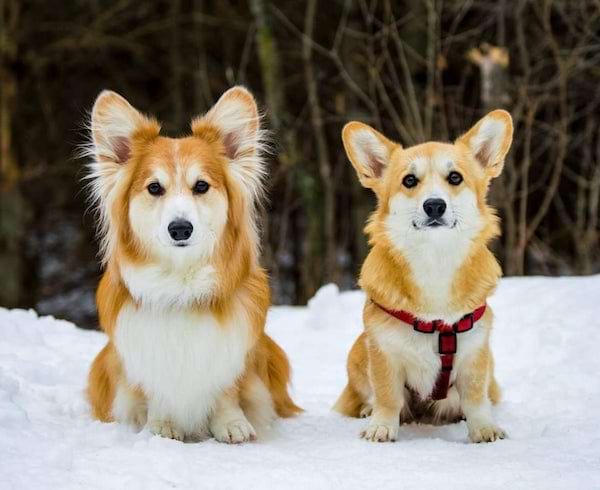
Fluffy Corgis, with their long, luxurious coats, are not your typical Corgis. They possess a recessive gene that results in this distinctive appearance. There are two sub-breeds of fluffy Corgis: the Pembroke Welsh Corgi and the Cardigan Welsh Corgi. These breeds have different genetic origins and physical traits.
Pembroke Welsh Corgis are believed to have Viking origins and share ancestry with Nordic Spitz dogs. Cardigan Welsh Corgis, on the other hand, have a lineage intertwined with German Teckels. They are larger and have long tails, distinguishing them from Pembroke Corgis, which have docked tails.
Fluffy Corgis are highly sought after for their unique look and charming personalities, but their rarity and demand make them relatively expensive. They are a fascinating breed with a complex genetic history, making them a subject of intrigue for dog enthusiasts.
How do you know if your corgi is flufy corgi?
Determining if your Corgi is a fluffy can be an exciting journey. Here’s how you can tell:
- Age Matters: The age of your Corgi is a crucial factor. Fluffy coats often become apparent as puppies grow.
- Breeder Visit: Pay a visit to the breeder when the puppies are still with their mother and littermates. This is the ideal time to assess their coats.
- Check for Feathering: Examine your puppy’s chest, ears, feet, and legs. If you notice excessive feathering at around four to six weeks of age, there’s a good chance you have a fluffy Pembroke Welsh Corgi or a fluffy Cardigan Welsh Corgi.
- Compare with Littermates: If possible, observe your puppy alongside its littermates. This can provide a valuable point of comparison.
- Patience is Key: If you can’t differentiate immediately, don’t worry. Sometimes, it takes time for the coat to fully develop.
Remember, whether your Corgi is fluffy or not, both coat varieties are equally charming and enjoyable to groom. Shower your furry friend with love and care, and they’ll thrive either way!
Physical Appearance
1.Fluffy Pembroke Welsh Corgi
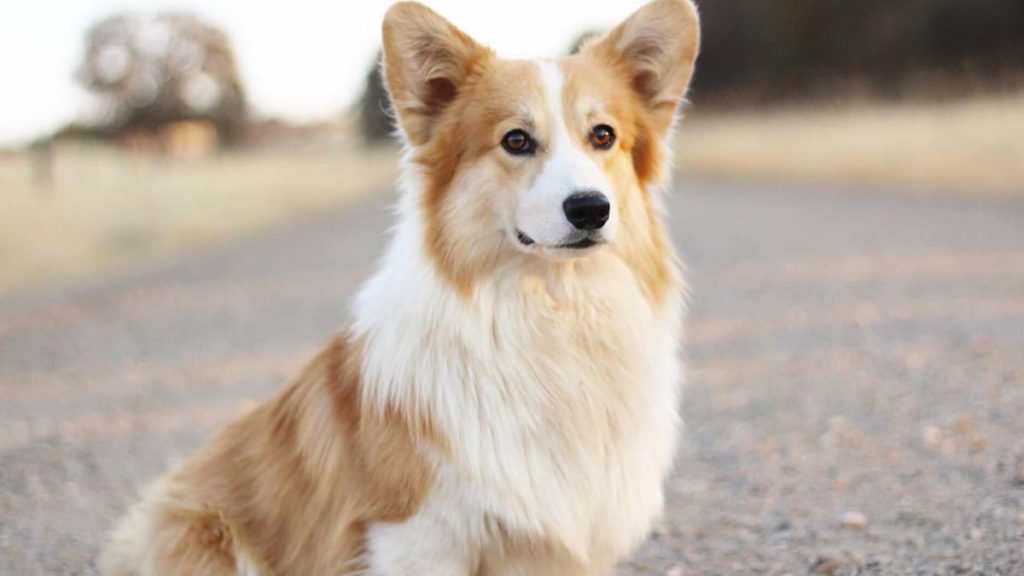
A fluffy Pembroke Welsh Corgi, distinguished by its lengthy and lavish coat, is a sight to behold. One of the most apparent features of a fluffy Pembroke is the excessive feathering in their ears, chest, feet, and legs, making them easy to spot. But wait, there’s more!
Let’s take a closer look at other parts of their physique. Their head is fox-like, and their eyes are medium-sized and oval-shaped. Their ears are erect and have rounded points, giving them an endearing look. Their chest is deep and well let down, and their tail is docked and almost invisible, if possible.
But, what about their coat color? Well, several hues are considered standard for the breed by major kennel clubs, such as red, sable, fawn, black, and tan. Their coat may also have white markings on their chest and feet, making them even more adorable.
If you’re lucky enough to own a fluffy Pembroke Welsh Corgi, you’ll know how essential grooming is to maintain their stunning coat. But, let’s be honest, they’re worth every bit of effort.
2.fluffy Cardigan Welsh Corgi
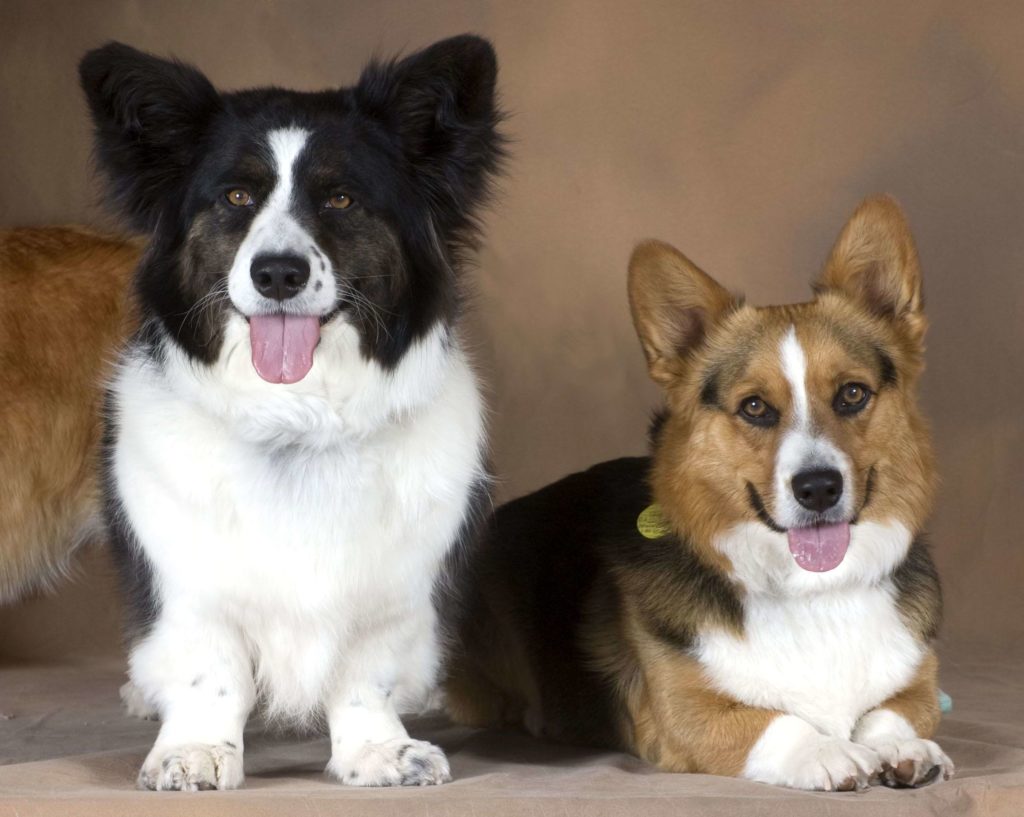
Allow me to impart some insights about the striking fluffy Cardigan Welsh Corgi, which boasts of an eccentric long coat. It’s worth noting that they are double-coated, with denser hairs than their Pembroke counterparts. According to the American Kennel Club (AKC), their outer coat is coarser in texture, but their undercoat is soft and voluminous.
As for their physical attributes, their head appears foxy-shaped, but it’s broader than the Pembroke Welsh Corgi’s. Their eyes are medium to large, and they are placed wider apart. Their ears are more rounded and larger than those of the Pembroke. When it comes to their chest, it has a round shape and looks more massive than the Pembrokes. Lastly, their tail is long and fox-like.
Size, height and weight
Have you been curious about how big a fluffy Corgi can grow? Well, you’re in luck because we have the information you need!
Whether you have a fluffy Pembroke Welsh Corgi or a fluffy Cardigan Welsh Corgi, their size is similar to their regular-coated counterparts. Let’s dive into the specifications:
1.Fluffy Pembroke Welsh Corgi
Height: These pups usually stand between 10 and 12 inches tall for both males and females.
Weight: Typically, males weigh around 27 pounds while females weigh around 25 pounds.
2.Fluffy Cardigan Welsh Corgi
Height: Both males and females usually stand between 10.5 and 12.5 inches at the withers.
Weight: Males weigh between 30 to 38 pounds while females weigh between 25 to 34 pounds.
It’s important to keep in mind that while Cardigan’s fluffies are heavier than Pembroke fluffies, weight should always be proportioned to their height. So, make sure to keep an eye on your fluffy’s weight and ensure they stay healthy and happy!
| Breed | Weight Range (Males) | Height Range (Males) | Weight Range (Females) | Height Range (Females) |
| Fluffy Cardigan Welsh Corgi | 30 – 36 pounds | 10.5 – 12.5 inches | 24 – 32 pounds | 10.5 – 12.5 inches |
| Fluffy Pembroke Welsh Corgi | 22 – 30 pounds | 10 – 12 inches | 22 – 30 pounds | 10 – 12 inches |
Coat colors and types
The colorful world of fluffy Corgi coats! The Cardigan Fluffy Corgi and the Pembroke Welsh Corgi Fluffy coat are all dressed up in stunning hues and patterns.
The Cardigan Fluffy coat Corgi comes in a variety of shades such as red and white, sable and white, black and white, brindle and white, merle, and blue merle. On the other hand, the Pembroke Welsh Corgi Fluffy coat features fawn, red, sable, black and tan, and black and white shades.
Both Corgi Fluffy coats types boast a dense and lush undercoat that adds volume to their cute and cuddly appearance. Their coarse top coat, meanwhile, offers a contrast of textures that enhances their overall appearance.
1.Blue Merle and White Fluffy Corgi
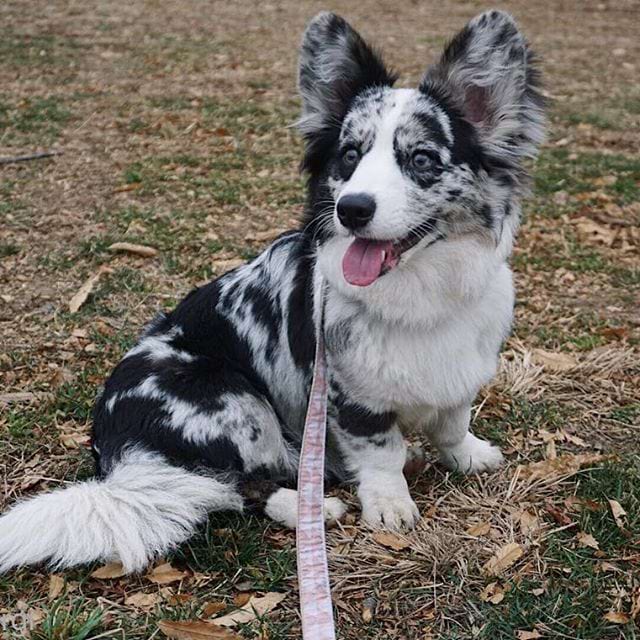
Blue merle Fluffy Cardigan Welsh Corgis are a sight to behold with their strikingly beautiful appearance. Their fur is characterized by mottled patches of black on a background of light gray coat, which can be accentuated by tan markings on the face, ears, and legs.
One of the fascinating features of Fluffy blue merle Cardigan Corgis is the possibility of having heterochromia, a condition where the dog’s eyes are of different colors, with one or both being blue. It’s a rare and stunning trait that adds to their overall charm and uniqueness.
It’s important to note that blue merle Fluffy Corgis are exclusively Cardigan Corgis, as the Pembroke Corgi doesn’t carry the merle gene, except in cases of hybridization. As with any other Corgi type, these pups have a dense undercoat and a coarse topcoat that require regular grooming to keep their coats healthy and shiny.
2.Black and White Fluffy Corgi
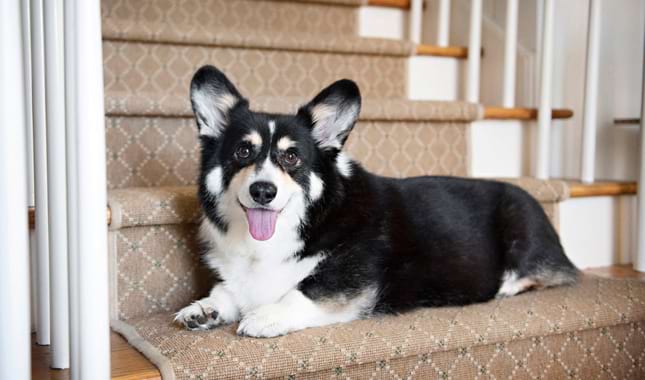
The Fluffy black and white Corgi possesses a stunning black body coat embellished with striking white markings. These bright white markings usually appear on the chest, head, and legs, which gives them an even more dazzling look.
3.Sable Fluffy Corgi
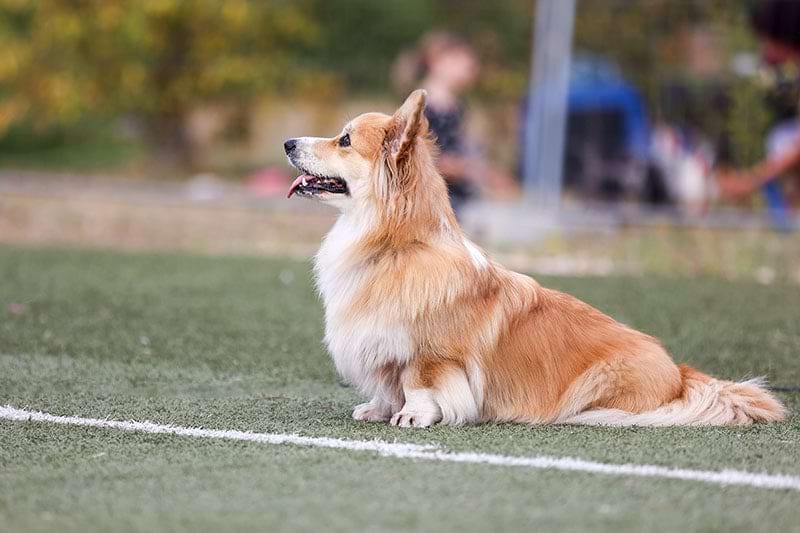
The Fluffy sable Corgi’s coat is predominantly reddish, with black fur appearing on the back. A dark-colored fur surrounds the edges of the ears, while a widow’s peak forms on the forehead with a somewhat dark-colored patch.
4.Red Fluffy Corgi
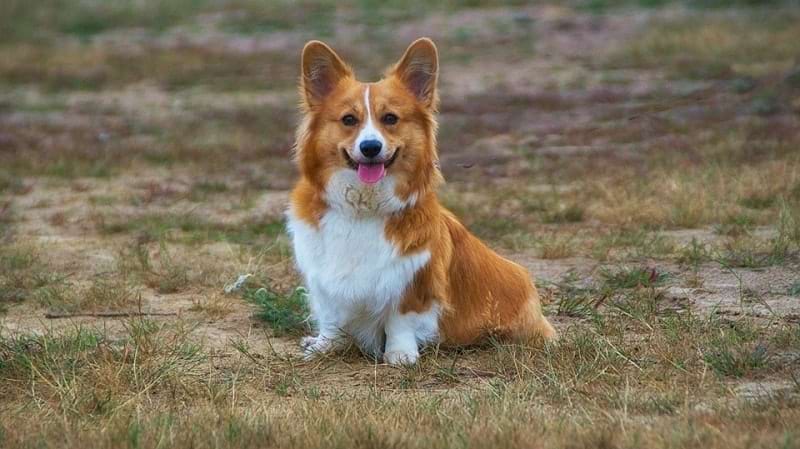
The Fluffy red Corgi flaunts a coat color that fluctuates from light fawn to dark red, absent of any black blotches. However, white markings may still be present on the neck, head, chest, and limbs.
5.Fluffy tricolor Corgi

Fluffy tricolor Corgis are a sight to behold! They can either be a Red-headed Tricolor or a Black-headed Tricolor Pembroke Corgi.
Red-headed tri color Fluffy Corgi have a red-colored head with white markings around the neck, muzzle, and legs. Black fur on the back blends into red or tan points, creating a stunning color contrast.
On the other hand, Black-headed tri Fluffy Corgi have black fur around the head and back of ears with white markings on the muzzle, chest, and underbelly. The ears, eyes, and legs also have tan points, making for a complex color pattern. The body of a Black-headed tricolor Fluffy Corgi is mostly black that does not blend into white or red points, creating a striking appearance.
6.White Fluffy Corgi
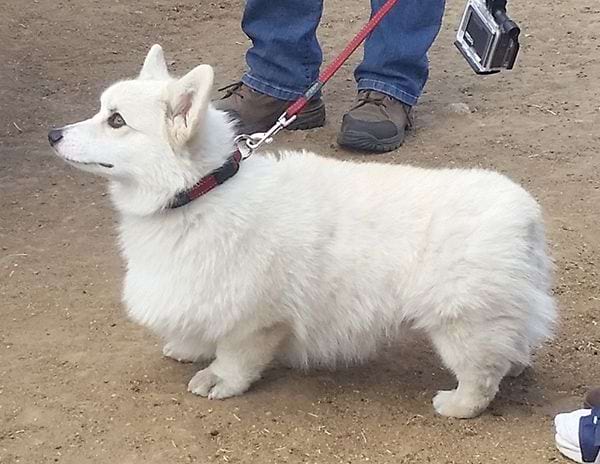
The white Fluffy Corgi is a rare sight with its entirely white coat without any dark markings or spots. The coat is thick and plushy with a double-layered fur that keeps the Corgi warm and cozy. These Corgis have a striking appearance and stand out from the other Corgis with their lustrous coat. The white Fluffy Corgis are mostly Pembroke Welsh Corgis and sometimes have a little bit of cream or light tan color on their ears, face, or back.
Temperament and Personality

Fluffy Corgis aren’t just cute, they’re also known for their well-rounded temperament. Let’s take a closer look at the disposition of two types of fluffy Corgis:
1.Fluffy Pembroke Welsh Corgi
First up, we have the Fluffy Pembroke Welsh Corgi. These furry buddies are excellent house pets and can also be great herders. They’re not too demanding but they sure love to snuggle up with their favorite humans. Fluffy Pembrokes are very affectionate and they respond well to obedience training. They’re bold and kind all at once, making them the perfect furry companions for any type of household.
2.Fluffy Cardigan Welsh Corgi
These pups are super congenial and loyal to their owners. They have the brains to match their beauty and respond well to different types of training.
Being vigilant guardians and herders, they are always alert and intelligent. They are also independent dogs, so expect some stubbornness from them. But don’t worry, they are still people-oriented and love to be around their beloved humans.
They are also great at responding to obedience training and have a bold yet kind demeanor. So, whether you choose a Fluffy Cardigan or Pembroke Welsh Corgi, you can expect a balanced and loving temperament.
Is Fluffy Corgi a good fit for families?
Fluffy Corgi dogs are known to make great family pets due to their affectionate and loyal nature. However, they have a tendency to nip at ankles as it is part of their herding instincts. They may also be wary of other dogs but early training and socialization can correct these behaviors.
Do Fluffy Corgi Shed A Lot?
Yes, Fluffy Corgis do shed, and their shedding habits are consistent throughout the year.
Corgis, whether they have a short or fluffy coat, are not hypoallergenic. They shed continuously, and their shedding tends to worsen during seasonal changes, particularly in summer and winter. To manage their shedding, regular brushing with a high-quality dog brush is essential. If you or someone in your household has allergies or is sensitive to dog hair, it’s advisable to consider a different breed, as Corgis are known to produce allergens that can trigger reactions.
Training
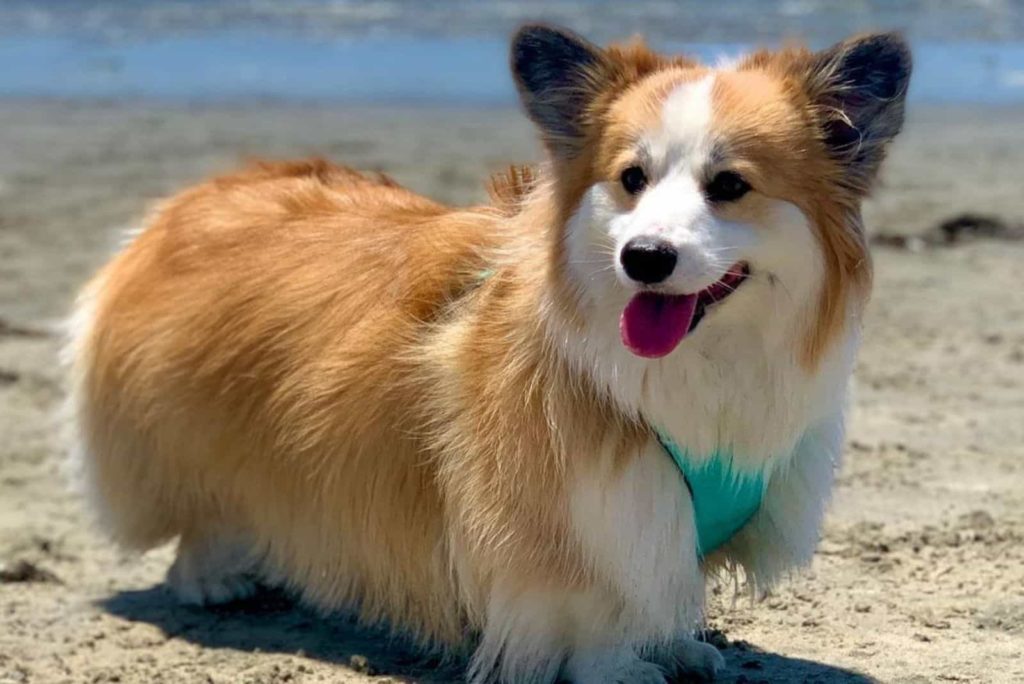
Beginning the training of your beloved Fluffy Corgi at an early age can have a positive impact on their development. At the tender age of 7 to 8 weeks old, socialization training can begin by introducing them to various locations, creatures, and humans. By the time they reach 6 months old, they can be trained in rudimentary commands and the art of crate and potty training.
Exercise Requirements
Fluffy Corgi puppies, whether they are Cardigan or Pembroke breeds, have specific exercise needs that you must pay attention to. To start, these cute pups should be getting at least 5 minutes of exercise for every month of their age. This means that if you have a 4-month-old Fluffy Corgi, he should have at least 20 minutes of physical activity every day. As they grow older, their exercise requirement should increase, with a minimum of an hour of exercise daily once they become adults.
Taking your Corgi for a walk is an excellent way to bond with your furry friend. Using a retractable dog leash will give you control while allowing your pup to explore and walk. Letting your Corgi play, jump, chase, and walk freely in the backyard is also a great exercise option. However, make sure your backyard is fenced in to keep them safe.
Grooming and Cleaning
Grooming your Fluffy Corgi can be tricky because of their varying coat fluffiness, but here are some tips you can try:
Brush them following the direction of their coat growth using the line method or a greyhound comb. During shedding season, use a dog rake to remove excessive hair.
Wash your Fluffy Corgi every 4 to 6 weeks using a high-quality shampoo and conditioner to maintain their soft and clean coat.
For nail grinding and underfoot hair trimming, use a curved shear for easier handling.
Take your Fluffy Corgi to a professional groomer twice a year for a proper cut and thorough cleaning of their ears, eyes, and other body parts.
If you’re more of a visual learner, you can watch a detailed grooming video to guide you through the process.
| Grooming Needs | Frequency |
| Coat Brushing | 3 to 4 times per week |
| Bathing | Once every 6 weeks |
| Ear cleaning | Weekly check and cleaning |
| Nail trimming | As needed or when they get long |
| Teeth brushing | 3 to 4 times per week |
Are Fluffy Corgi Hypoallergenic?
No, Fluffy Corgis are not hypoallergenic.
While Fluffy Corgis are undeniably adorable, their hypoallergenic status is a “no.” These dogs have a fluffy double coat that can trap allergenic substances like dander and saliva. Even if a Corgi doesn’t shed much, these allergens can still be present, making them problematic for allergy sufferers.
Excessive shedding can exacerbate the issue, making it even more challenging for those with allergies. If you or someone in your household has allergies, it’s crucial to consider the potential allergic reactions before bringing a fluffy Corgi into your home.
Food and Diet
When it comes to feeding your beloved fluffy Welsh Corgi, it’s important to keep in mind their age and nutritional needs. If you have a fluffy Corgi puppy, they will require about ¾ to 1 cup of either puppy or all-life-stages high-quality dog food, which you should portion into three (3) servings a day.
As they grow up and become adults, their food intake will increase, and you should feed them around 1.5 to 2 cups of food, divided into two servings. Remember to choose a high-quality dog food that meets their dietary requirements and provides them with all the necessary nutrients to keep them healthy and happy.
Common Health Issues
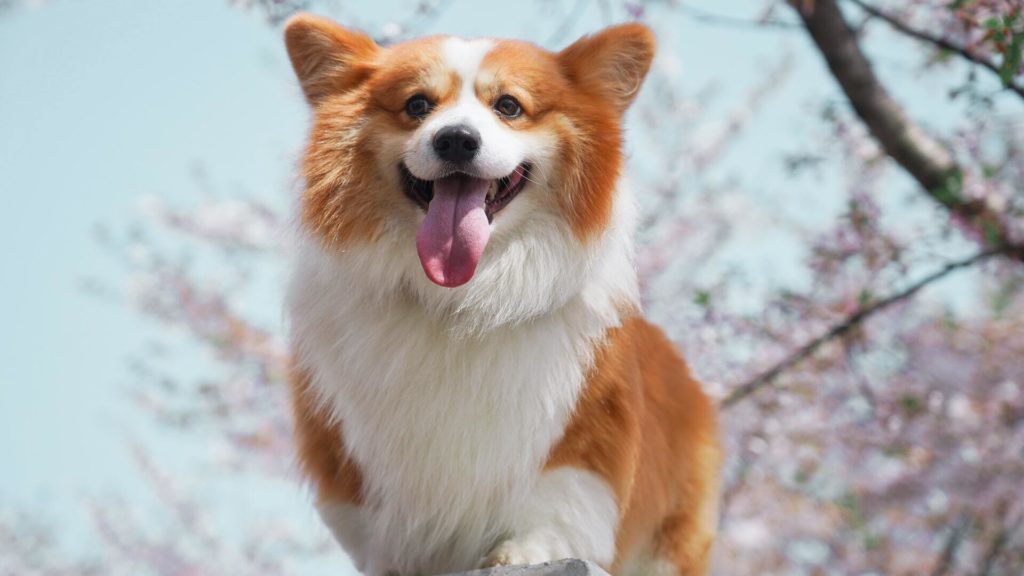
Although they’re generally healthy pups, there are a plethora of hereditary diseases that can rear their ugly heads later on in life. Here are just a few of them to get your tail wagging:
1. Hip Dysplasia
Hip Dysplasia, a common hereditary disease among fluffy Corgis, is a hip joint abnormality that may lead to limping and discomfort.
2. Obesity
Obesity is a multifaceted and pervasive issue that plagues canines of all shapes and sizes. It is a well-established fact that Fluffy Corgis, with their voracious appetites and predisposition to weight gain, are particularly susceptible to this condition.
Alas, a corpulent Fluffy Corgi is not only aesthetically unappealing but also prone to an array of deleterious health consequences, including but not limited to diabetes mellitus and arthritis, which can significantly compromise their overall well-being and longevity.
3. Intervertebral Disc Disease (IVDD)
Fluffy Corgis have long backs that predispose them to intervertebral disc disease (IVDD). This disease is characterized by ruptured spinal discs, which can lead to paralysis or loss of limb function. It’s important to be mindful of this condition and seek immediate veterinary attention if you suspect your Corgi may be affected.
4. Hypothyroidism
Hypothyroidism is a pathological condition that is intricately linked to an aberration in the endocrine system. This condition stems from a malfunctioning thyroid gland that fails to synthesize and secrete adequate quantities of thyroid hormone, culminating in an imbalanced state of hormone equilibrium.
As a direct consequence of this metabolic disarray, the afflicted canine exhibits a host of debilitating symptoms, which include but are not limited to lethargy, malaise, and conspicuous weight gain. These clinical features, while seemingly innocuous, can significantly undermine the animal’s physiological and psychological well-being, rendering them vulnerable to a litany of additional health complications.
5. Eyes Problem
Cataracts, a pesky eye condition, can strike fluffy Corgis and cause their peepers to become cloudy and blurry. The good news is that surgery can help improve their vision. So if you notice any changes in your fluffy Corgi’s eyes, better bring them to the vet pronto.
6. Von Willebrand’s Disease
Fluffy Corgis are prone to a disease called Von Willebrand Disease, which is a disorder that inhibits their blood from clotting. Typically, this disease manifests in Corgis when they reach the age of three to five.
7. Heart Issue
Patent ductus arteriosus is a complex and insidious congenital cardiac anomaly that has far-reaching implications for the cardiovascular health of canines.
This intricate pathological state arises from a pivotal defect in the ductus arteriosus, a fetal vessel that facilitates the shunting of blood away from the lungs, causing a cascade of deleterious events that culminate in left-sided heart enlargement and eventually, the ominous specter of congestive heart failure.
The insidious nature of this condition is such that its clinical manifestations may not be immediately apparent, making early diagnosis and targeted therapeutic intervention all the more crucial in mitigating the associated morbidity and mortality.
Failure to heed the clarion call of this pathological condition can have dire consequences for the hapless animal, rendering them susceptible to a host of additional health complications and ultimately compromising their long-term well-being.
8. Epilepsy
Epilepsy is a formidable neurological malady that can inflict an indelible toll on the afflicted canine. This enigmatic condition arises from a multifaceted interplay of intricate physiological and biochemical processes, culminating in the aberrant firing of neuronal activity in the brain.
The clinical hallmark of this pathological state is the abrupt onset of seizures that can manifest in a myriad of unpredictable ways, rendering the hapless animal susceptible to injury, trauma, and long-term morbidity.
To ameliorate the deleterious impact of this condition, it is crucial to engage in timely and targeted therapeutic interventions that can mitigate the severity and frequency of the seizures, ultimately paving the way for a better prognosis and an improved quality of life for the affected canine.
9. Degenerative Myelopathy
With degenerative myelopathy, the fluffy Corgis may experience a progressive and debilitating condition that affects their spinal cord. It usually starts with a mild difficulty in walking, and as it progresses, it leads to paralysis, lameness, and muscle atrophy.
While there is no known cure for degenerative myelopathy, physical therapy and medication may help manage the symptoms and improve the dog’s quality of life.
How Long Does Fluffy Corgi Live?
When it comes to the lifespan of a Fluffy Corgi, there are many factors to consider. These adorable pups are known for their loyal and affectionate nature, and as such, they can be enjoyed by their human family for up to 12 to 15 years, provided they are given proper care and attention.
However, it is important to note that the life expectancy of a Fluffy Corgi can be influenced by a number of factors, including their genetics, diet, exercise routine, and overall health. Additionally, certain health conditions, such as hip dysplasia and obesity, can also impact a Fluffy Corgi’s lifespan and overall quality of life.
That being said, with the right care and attention, Fluffy Corgis can live long, happy, and healthy lives, providing their owners with years of companionship and love. So, whether you’re considering adopting a Fluffy Corgi or are already the proud owner of one of these lovable pups, it’s important to be mindful of their needs and to provide them with the care and attention they require to thrive.
How Much Is The Price of Fluffy Corgi?
When it comes to the price of a Fluffy Corgi, one must be aware that it’s not going to be a cheap purchase. Compared to regular Corgis, Fluffy Corgis are more expensive, ranging from $1,000 up to $4,000. The reason for this is that Fluffy Corgis are considered rare and are not always available in a litter, even if both parents are fluffies.
Is Fluffy Corgi Right For Me?
When considering if a Fluffy Corgi is the right dog for you, there are several factors to consider. First and foremost, Fluffy Corgis are an ideal family pet due to their friendly and devoted nature.
However, they have a strong herding instinct, so if you have other smaller pets in your home, be prepared for some high-energy chasing around. In terms of grooming, these dogs have moderate shedding, which can be managed with proper grooming tools and techniques. Overall, the Fluffy Corgi is a wonderful companion for those who are willing to provide the necessary exercise, attention, and care.
List of dogs that are similar to Sable Corgi
- Corgi-Blue Heeler Mix
- Corgi-Dalmatian Mix
- Corgi-St. Bernard Mix
- Corgi-French Bulldog Mix
- Corgi-Boxer Mix
- Corgi-Pomeranian Mix
- Corgi-Poodle Mix
- Corgi-Pug Mix
- Corgi-Yorkie Mix
- Sable Corgi
- Blue Merle Corgi
Frequently Asked Questions
1.Are Fluffy Corgis a breed?
Not exactly. They are not a distinct breed but rather a variation of the Pembroke or Cardigan Welsh Corgi. Fluffies are purebred just like their regular-coated counterparts, and the only difference is their long and dense fur. So, if you have a fluffy Corgi, you still have a purebred Corgi!
2.Does Fluffy Corgi like to be cuddled?
Fluffy Corgis are known to be clingy and affectionate, so cuddling is definitely on the table. They see their owners as part of their pack, and they feel the need to protect them. This is why they’ll probably be by your side most of the time.
3.Can Fluffy Corgi be along?
Fluffy Corgis shouldn’t be left alone all day.
They’re bred as herding dogs and thrive on companionship. Without proper company, they could develop separation anxiety, leading to destructive behavior.
Conclusion
In conclusion, the Fluffy Corgi is a unique and adorable variation of the classic Corgi breed. Their long and soft coat gives them a distinct look that sets them apart from their smooth-coated counterparts.
With their playful and affectionate personalities, Fluffy Corgis make excellent family pets and loyal companions. Whether you’re a Corgi lover or simply looking for a new furry friend, the Fluffy Corgi is definitely worth considering.

Pingback: Sable Corgis 101: Everything You Need to Know 2023
Pingback: Blue Merle Corgi: Exploring the Fascinating World of Corgis 2023